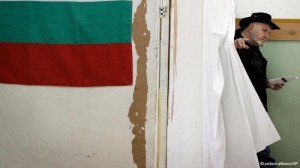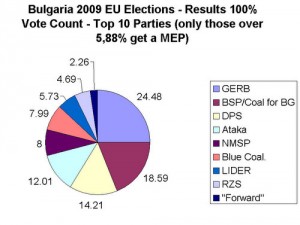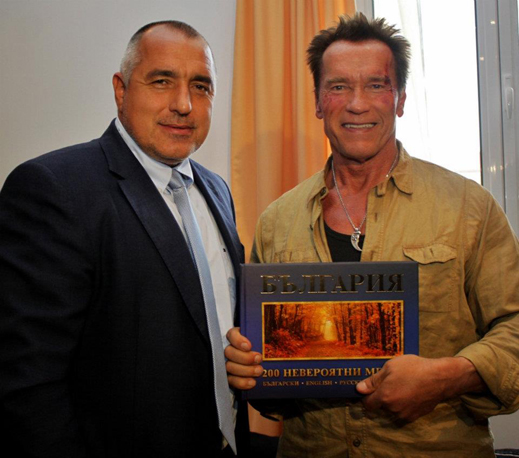Bulgarian Cabinet resignation – what happens next?
Plamen Oresharski formally resigned as prime minister on July 23, after weeks of speculation and – in certain quarters – anxiety about whether he would play his part in carrying out the agreement reached by political parties to hold early parliamentary elections.
The Wall Street Journal: Bulgaria’s Prime Minister Plamen Oresharski late Wednesday submitted his resignation to parliament, a move that will lead to his entire cabinet stepping down after a tumultuous year marked by public protests, a banking crisis and confrontations with the European Union. [more]
Bulgarian Outgoing Ministers React to Cabinet Resignation: Most of Bulgaria’s outgoing ministers have assessed their work in office as “positive” and have voiced warnings the next government would face a number of issues. [more]
Deutsche Welle: Socialist-backed Oresharski Cabinet resigns in Bulgaria. Bulgaria’s prime minister has resigned ahead of snap elections to end months of political turmoil in the European Union’s poorest country. The legislature as expected approve the resignation on Thursday. [more]
New York Times: The fate of one of the biggest banks in the European Union’s poorest country, Bulgaria, remains hostage to a political crisis, which caused the prime minister’s government to resign on Wednesday. [more]
BBC: Bulgaria prime minister quits to allow snap election. The embattled Socialist prime minister of Bulgaria has resigned after only a year in office to allow for an early election on 5 October. [more]
MORE to COME:
- August 5, 2014 – President Plevneliev announces the line-up of the caretaker Cabinet, which will have reduced powers and whose main task will be to prepare and hold the snap elections. This will be the second caretaker government appointed by Plevneliev, who was elected on the GERB ticket in 2011 – in March 2013, he appointed ambassador Marin Raykov as caretaker prime minister.
- August 6, 2014 – the 42nd National Assembly is officially prorogued by presidential decree.
- October 5, 2014 – Bulgaria holds early parliamentary elections.
HISTORY of EVENTS:
- Bulgarian Elections 2013
- Election Results in Bulgaria 2011
- Election’s Perspectives for Bulgaria
- Bulgarian Elections 2009
Bulgarian Elections 2013
 Although one of the rightist parties just won the 2013 parliamentarian Bulgarian elections by a fraction, it lacks the needed majority to form an independent government. The Socialist party, second in the ballot, is searching an uneven alliance with the nationalists from “Attack” and the Turkish ethnic DPS (Right and Freedom Movement). Neither the Union of democratic forces nor the political movement of ex-king Simeon II Saxe-Coburg-Gotta was able to cross the 4% election barrier required to enter Parliament. Thus, the only two parties who in years past were able to form independent democratic governments (respectively 1997 and 2001), now remain in the periphery of Bulgari’s political life.
Although one of the rightist parties just won the 2013 parliamentarian Bulgarian elections by a fraction, it lacks the needed majority to form an independent government. The Socialist party, second in the ballot, is searching an uneven alliance with the nationalists from “Attack” and the Turkish ethnic DPS (Right and Freedom Movement). Neither the Union of democratic forces nor the political movement of ex-king Simeon II Saxe-Coburg-Gotta was able to cross the 4% election barrier required to enter Parliament. Thus, the only two parties who in years past were able to form independent democratic governments (respectively 1997 and 2001), now remain in the periphery of Bulgari’s political life.
BBC: Bulgaria election fails to end political stalemate
DW: Bulgaria election fails to end political deadlock
NYT: Few Vote in Bulgaria as Apathy Prevails
In regard to the current political crises, as early as 2009 our team warned that if the newly elected government continues to use the same local level (city, municipality) political paradigms to run the country as EU member crises will be inevitable. Two years later, as half of the parliamentarian term has passed, we further advised in “Election’s Perspectives for Bulgaria” that as Bulgaria’s Prime Minister elect did not take the much expected place as a presidential candidate, his political strategy would be strongly criticized by his opponents as inadequate and insufficient to answer Bulgaria’s problems. In the beginning of 2013 as political distress grew, the government was forced to resign amid open protests and high rate of the government disapproval.
Meanwhile, after almost entering Bulgaria’s parliament in 1997, the Bulgarian Christian Coalition, traditionally representing the Protestants in the country, remains on the borderline of any political existence. Bulgarian evangelicals were never able to reach their political legacy again, although the new Bulgarian census showed over 25% increase of evangelical population in Bulgaria to some 65,000 people strong. The alternative party, Christian Democratic Forum has showed no political activity since it was established a decade later and quickly defeated by having less than 1,000 votes nationwide. The Bulgarian Christian Coalition has also chosen not to run in the upcoming elections.
Election’s Perspectives for Bulgaria
Bulgaria’s fall season has again become a colorful arrangement of political attitudes and campaigns toward the upcoming Presidential Elections on October 23, 2011. To add to the political theater at hand, Prime Minister Boyko Borisov thoughtfully scheduled the shooting of The Expendables 2 to take place in Sofia, Bulgaria a week before the elections.
Sylvester Stallone has been in Sofia for the past month or so, Dolph Lundgren for the past few days. Chuck Norris landed in Bulgaria last week, and now Bulgaria’s Prime Minister patiently is waiting for governor Schwarzenegger to arrive along with Bruce Willis before an official public meeting before the press with the star cast as part of his political campaign.
This time however, the nation’s political and ethnic tensions were rebirth anew after a civil unrest followed the death of two Gipsy boys in the village of Katunutza. The ruling party GERB was strongly criticized by its opponents for the way police handled the wave of protests that followed throughout the country.
Meanwhile, a total of 79 political parties and formations are already registered for the elections on October 23, 2011. Only seven of them are expected to have the necessary electorate to finish the race. They are as follows:
(1) GERB (Bul. “coat of arms”) the Bulgarian abbreviation means Citizens for European Development of Bulgaria took over the parliamentarian elections a few years back with the strong political figure of leader Boyko Borisov, who began his colorful career as fireman and personal bodyguard of ex. king Simeon and Bulgarian communist dictator of over 30 years Todor Zhivkov. Borisov became minister-general of Internal Affairs, mayor of Sofia and serves currently as Bulgaria’s Prime Minister. While he has not taken a much expected place as a presidential candidate, his political strategy has been strongly criticized by his opponents as inadequate and insufficient to answer Bulgaria’s current crises.
(2) BSP, the Bulgarian Socialist Party has followed a leftist communist trend for over a century now, being empowered by economic and structural recourses inherited by the Regime and Russia’s political strategies on the Balkans. Ruled in the triple coalition in the previous government mandate along with the party formed by the ex-king and Turkish minority, it has been represented in the past decade by current president with two consecutive mandates.
(3) Bulgaria’s Democratic Forces, a rightist party of 21 years is now lead by recognized evangelical Martin Dimitrov, but unofficially ruled by ex. prime minister Ivan Kostov. The party has again disappointed their supporters by being a small and inefficient political force, which remains in the periphery of Bulgaria’s political realm with small voting power and virtually no influence on government polices.
(4) NDSV (abr. National Movement for Stability and Progress) formed at the turn of the century by Simeon Saxe Coburg Gotha – Bulgaria’s ex-king returning after a 50-year exile. The party was a major political player since its coming to power in 2001, but has remained virtually uninvolved in recent years boxed by a political coffin created by both socialists and democrats after its last mandate ended. One of their activists, Mrs. Miglena Kuneva, currently serving as EU parliament deputy has launched a campaign as independent presidential candidate.
(5) ATAKA (Bulg. Attack) as always is absorbing the negative vote, which comes from the people disliking current government politics, socialism and minority parties. Their methods have been rightfully characterized as dangerous with extreme pro-Bulgarian chauvinism bordering nationalistic ideologies. The party was involved in a fire-related attack against the central mosque in Sofia and consecutively organized protests flaming ethnic and political unrest in the recent incidents at the village of Katuntza.
(6) RZS (abr. Order, Law and Justice) although keeping away from nationalistic ideologies, it resembles ATAKA, being a minor but scandalous political formation. RZS received sufficient vote in the last parliamentarian elections through presenting a series of compromising publications in major Bulgarian periodicals. These politics have been continued through RZS’s participation in government life, as the party was the first one to start its current campaign branded with the phrase “I’ll fire Boyko Borisov!”
(7) DPS (Bulg. Movement for Rights and Freedom) was formed on ethnic foundation of Bulgarian Turkish and Muslim population. It has remained the constant “balancer” in Bulgaria’s political life providing the necessary votes to one or another formation only to remain in power. DPS was blocked almost permanently after the last parliamentarian elections, but only until now when it is strongly entering Bulgaria’s political scene again.
After almost entering Bulgaria’s parliament in 1997, the Bulgarian Christian Coalition has again remained on the borderline of any political existence. Bulgarian evangelicals have never been able to reach their political legacy again, although the new Bulgarian census showed over 25% increase of evangelical population in Bulgaria to some 65,000 people strong. The alternative party, Christian Democratic Forum has showed no political activity since last election when it was defeated having only some 1,000 votes nationwide. The Bulgarian Christian Coalition has also chosen not to run in the presidential elections.
Bulgarian Elections 2009
Boyko Borisov, Sofia mayor, leader of the winner in the general elections GERB and already self-proclaimed prime minister of Bulgaria, embarked on his voyage for the higher office with the promise that Bulgaria is a different country and the guilty will be brought to justice.
“I don’t have the right not to lead Bulgaria’s next government,” Boyko Borisov said at his first press conference after the vote, warning, however that no miracles are to be expected in the next half a year.
“No miracles should be expected to occur in the next five or six months. And we haven’t promised any,” Borisov told reporters at the press center of the National Palace of Culture in Sofia.
“This is the first time that Bulgarians vote for someone whom they know what he can and cannot do. Even if you are in love, you can fall out of love for ten years,” Borisov said, referring to his time in office as Interior Ministry Chief Secretary and Sofia mayor.
Asked about his promise to enter the office of the prime minister only in case of emergency, Borisov said:
“The total collapse of the three-way ruling coalition made me step into the prime minister office.”
Borisov vowed to launch investigations into all shady deals of the government and the land swaps in particular, backing his words with probes that he has initiated in his capacity of mayor of the capital Sofia.
“If we mislead the voters, we will get where Simeon Saxe-Coburg is now,” Borisov said, referring to the sorry results of the former king and prime minister, who didn’t make it to the next parliament.
Asked about the date when he will leave the office of the mayor of capital, he laconically said:
“I will inform you of that when the time comes.”
Borisov was also cautious about the coalition possibiolities he is willing to enter into, saying that after the final results come out, he will invite the parties in the center-right part of the political spectrum for negotiations.
“We want to be a government of all people,” Borisov said.
“I want to thank those, who voted for us and assure those who did not that we will try to lead politics good for all Bulgarian people,” he added, referring to the ethnic Turks in particular, who in his words, “should not listen to those, who play on their fears.”
BULGARIA VOTES in the EU Parliament Elections
European Parliament Elections leave Bulgarian Evangelical Churches with no venue of political support.

As an EU member, Bulgaria voted in the EU Parliament Elections on June 6, 2009. After the 100% count, it was announced that GERB (new centrist party led by Sofia’s mayor Boyko Borisov) has won 24.48% of the votes with 627,693 votes. The Socialist Coalition for Bulgaria totaled 476,618 votes or 18.59%, the Turkish Movement for Rights and Freedoms (DPS) received 364,254 votes or 14,21%, the Nationalist Ataka got 307,985 or 12,01%, the National Movement for Stability and Progress (NMSP) of former Tsar and former PM, Simeon Saxe-Coburg, secured 205,145 votes or 8%, and the democratic Blue Coalition got 204,784 or 7.99%. Read more
Municipal Elections 2007
The commission for declassification of the secret services archives announced on October 25 that of the candidate mayors registered by the election committee, 420 had collaborated with the former secret service, BTA said.
Of the candidates in Sofia and its regions, 10 had worked with the service, Focus news agency said. Only two candidates for the central city had worked with the secret service, Brigo Asparuchov, candidate for the Bulgarian Socialist Party and Radko Hadzhiev, , candidate for United National Front.
The other eight former agents were candidates for regions and included Boyan Boyadzhiev, GERB candidate for Vitosha, Dimitur Dimitrov, candidate for Bulgarian Socialdemocrats in Krasna Polyana, Ibrahim Karahasanov, candidate for the Green Party in Lyulin, Ivan Petro, candidate for the Green Party in Lozenets, Lyudmil Yordanov, candidate for GERB in Oborishte, Plamen Krustev, candidate for BDNIE in Ilinden, Boiko Koichinov, candidate for BDNIE in Krasno Selo and Stefan Gulubov, candidate for BDNIE in Triaditsa.
Two of the members of the Central Election Committee (CEC) collaborated with the communist-era secret services, the commission for declassification of the secret services archives said on October 23 2007.
The two are Roumen Elenski and Tsvetozariya Iosifova-Krusteva, mediapool.bg said. Iosifova-Krusteva was a secret collaborator and held agent quarters. She worked for the services until 1990. Elenski was on the staff of the services. In 1982, he become an intelligence agent and in 1985 was sent to the KGB school in the USSR. In 1989, he became senior intelligence agent. National Movement for Stability and Progress nominated Iosifova-Krusteva for the CEC in 2003, while Elenski was nominated by Bulgarian Socialist Party in 2005.
Some 15 000 to 20 000 voters are to arrive to Bulgaria’s Kurdjali on October 28, the day of the municipal elections, Citizens for the European Development of Bulgaria (CEDB) informal leader Boiko Borissov said on October 21 2007.
Bulgarian Parliament and the three ruling parties, Bulgarian Socialist Party (BSP), Movement for Rights and Freedom (MRF) and National Movement for Stability and Progress (NMSP) made that possible, Borissov said as quoted by mediapool.bg.
Borissov called “nasty and foul insinuation” the statements that if CEDB nominee for Blagoevgrad mayor Kiril Pandev won the elections, he would agree to storage of Sofia’s waste in Blagoevgrad. In the beginning I enjoyed these statements, there were similar rumour about Vidin and other cities as well, Borissov said. The administrative potential of Bulgarian cities, including Sofia, was small and European funding remained unutilised. “Only 10 to 15 per cent of the money is utilised and in the same time we complain that we are poor, hungry and weak,” Borissov said.
Bulgaria: Local Elections 2003
In October, Bulgaria held local government elections. The elections created severe tension in the political situation of the country as the current government is failing to provide the promised results in the first 800 days of the political program. The government is headed by Bulgaria’s former King Simeon, who ruled for three years until he was nine, when his family was exiled from Bulgaria after the Communist take-over in 1944. In 2001, he was named as Bulgaria’s prime minister becoming the first exiled East European monarch to return to power.
Four major political forces participated in the elections. Among them were the National Movement “Simeon II” (now in power), the Bulgarian Democratic Party (in power during 1997-2001), the Socialist Party (in power in during 1996-1997) and Liberty and Rights Movement (representing the minority Muslim population of Bulgaria). While final results of polls will become clear after the second round in a week, it is already clear that the ruling political party did not win the local elections.
As the government is getting close to their first 800 days the statistics are the least to say threatening. More than 65% of the Bulgarians live with less than 100 Euro a month, while large corporations close to the government are increasing in income and status. The medications are 40% more expensive than two years ago and the cost of electricity has doubled. One million Bulgarians have immigrated since 1990.









